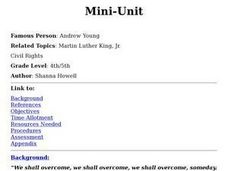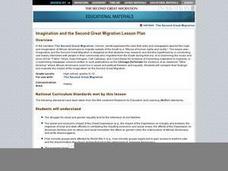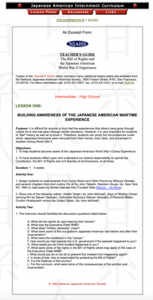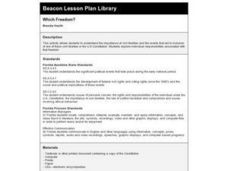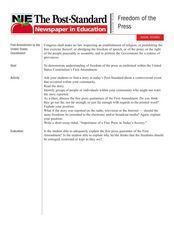Curated OER
Eleanor Roosevelt -- Human Rights Advocate
Eighth graders examine the role of Eleanor Roosevelt as a human rights advocate. Students use this lesson to prepare for a field trip to National Historic sites.
Curated OER
Freedom and Dignity Project
Young scholars apply real life historical experiences towards the analysis of civil rights. They read handouts on the presidency of FDR, participate in a debate about the internment of Japanese Americans, and analyze primary source...
Curated OER
Lambdin Milligan and the Writ of Habeas Corpus
Students research the case of Lambdin Milligan, a confederate supporter who was sentenced to death in Indiana during the time of the Civil War. They investigate the need to suspend civil liberties during the time of war.
Curated OER
The Senate by a Senator
Students examine their Canadian citizenship by participating in a number of multi-disciplinary lessons.
Curated OER
Human Rights : Historical Process towards Individual Application
Students compare governments as they relate to human rights of its citizens.
Curated OER
We Can Change the World!
Students use newspapers and websites to examine human rights' abuses issues. They consider how these rights' abuses relate to citizens' rights. Following their research, they write a journal entry and discuss an action or project they...
Curated OER
Andrew Young
Students explore Andrew Young and his role alongside Dr. Martin Luther King, Jr., during the Civil Rights Movement.
Curated OER
Jackie Robinson, Civil Rights Advocate
Students examine the life of Jackie Robinson and the ways in which he and they can influence government policy.
Curated OER
Priorities and Power: Migrants and Voting
Pupils examine the African-American migrants entry into the political process. They summarize their findings in a short essay.
Curated OER
Change: Just a Matter of Time
Students analyze the Declaration of Independence and primary sources to explain civil rights. Then, students write a Declaration of Change to express the grievances of African Americans, and their desire to participate fully in the...
Curated OER
JUSTICE
Students analyze the role that Alabama played in three major events of American History and how those roles contributed to Alabama being dubbed the "Cradle of the Confederacy" and the "Birthplace of the Modern Civil Rights Movement."
Curated OER
Imagination and the Second Great Migration
Learners examine the struggle for racial and gender equality and for the extension of civil liberties. They access websites imbedded in this plan to research, then write about past struggles for gender and racial fairness.
Curated OER
Building Awareness of the Japanese American Wartime Experience
Pupils research the Japanese American World War II Camp Experience. They discuss the experience in the context of civil rights and the Bill of Rights.
Curated OER
Which Freedom?
Fourth graders choose on the freedoms in the Bill of Rights and research it on the internet. They answer specific questions using their research and produce a written document using a computer.
Curated OER
Judges in the Classroom Lesson Plan
Students study case studies and determine the rights of the people who are in conflict.
Curated OER
Judges in the Classroom
Students study the history of the Bill of Rights and discuss the first ten amendments. The class is put into groups and each group is responsible for knowing 5 statements from the history of the Bill of Rights. Then the class plays a...
Curated OER
Judges in the Classroom
Learners examine the classification categories of rights including liberty, security, cultural, and group rights. They identify and analyze the various similarities and differences among five countries and their constitutions.
Curated OER
Fight for Freedom
Students research examples of slavery in the world today, and explore some ways they can help current slaves gain their freedom. After students develop a plan for helping to fight slavery, they take action.
Curated OER
America's Civil Rights Movement, Activity Two
Students investigate the human stories or the American Civil Rights Movement.
Curated OER
America's Civil Rights Movement, Activity Four
Students investigate the concept that people died during the Civil Right;s Movement using the Matix method.
Curated OER
Brother Outsider
Students view the film "Brother Outsider" and read an article by Bayard Rustin as springboards to discuss the concept of civil rights in the United States. They follow a discussion guide.
Curated OER
Boomtown
High schoolers view a series of films that explore evolving concepts of civil rights in America. They consider the civil rights of African-Americans, the aged and homosexuals. They discuss the films and complete worksheets.
Curated OER
"Open Mic" - Giving Creative Expression To The Connection Between The Japanese American Internment, September 11, And Our Rights Today
Students explore the similarities of the Japanese-American experience in WWII and Arab-American experience in post-September 11 US policy. They create presentations on their reflections and express themselves through poetry, dance,...
Curated OER
Freedom of the Press
Tenth graders explain the "watchdog" role of the press. They identify varied roles that citizens, reporters, and editors play in maintaining a free press. They identify value conflicts between freedom of the press and other rights.







